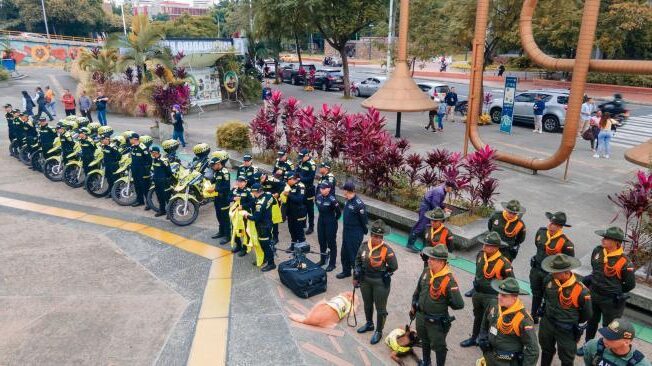Cali, Colombia: In a city known for its resilience and strength, the shadows of fear creep slowly through the streets of Cali. As security systems falter, the people of this vibrant community find themselves questioning the very tools meant to protect them. The promise of safety has been muffled by the silence of malfunctioning cameras and forgotten alarms, sparking a growing call for accountability.
A City’s Cry for Safety
In recent months, Cali has witnessed the unraveling of its security systems. Community alarms lie dormant, and the cameras that once stood as silent sentinels of protection have failed to capture the real story of fear and vulnerability that now echoes through the streets. Take, for instance, the story of a schoolteacher—an everyday hero whose safety was compromised on a regular afternoon. She was assaulted by two men on a motorcycle, right outside her school. Though a camera captured a piece of the incident, there was no trail to follow, no complete picture to guide the authorities toward justice.
This is not just the story of one woman. It’s the story of many—a collective of voices that feel unheard, unseen, and unprotected.
The Data Behind the Alarming Trend
Cali’s security systems, designed to be the city’s shield, have crumbled in places where they are most needed. Recent audits by the Contraloría de Cali reveal that in multiple neighborhoods, cameras have either never been operational or have suffered from neglect, lacking the necessary maintenance to keep them functioning. According to officials, “in some areas, cameras have stood as nothing more than hollow symbols, their lenses clouded, their purpose unfulfilled.”
Across the city’s comunas and corregimientos, where the pulse of Cali’s communities beats strong, the absence of reliable security has left families on edge. The promise of protection has turned into a hollow gesture, and in some cases, the knowledge that security systems don’t work has emboldened those with ill intent.
But the numbers don’t just speak to broken machines; they speak to broken trust.
A Reckoning: The Citizens Demand Accountability
On October 2, in the heart of the city at the Escuela Nacional del Deporte, the Contraloría de Cali has called for a citizen’s audience. The message is clear: enough is enough. This will not be a quiet meeting. It will be a reckoning, where the people of Cali, their leaders, and their law enforcers will face the truth together.
Alejandro Eder, the Mayor of Cali, alongside Jairo García, the Secretary of Security and Justice, and Commander of the Cali Metropolitan Police, Colonel Carlos Germán Oviedo, will sit before the very people whose safety they vowed to protect. It is expected to be an emotional gathering, one where numbers and data will intersect with stories of fear, frustration, and the universal human need for security.
Why Community Trust Is the True Casualty
In a world where technology is supposed to serve as our protector, its failure does more than expose us to physical danger—it erodes the trust that holds communities together. The cameras, positioned to watch over schools, homes, and public spaces, now stand as stark reminders of promises left unkept.
For some, the physical threat looms large. But for others, the greater threat is the slow unraveling of faith in the systems that are meant to shield us from harm. As the Contraloría continues to gather reports, one message remains clear: this isn’t just about equipment that needs fixing. It’s about mending the fragile threads of trust that bind a city.
The Path Forward: What Must Be Done
Cali’s security crisis is not without solutions. To rebuild what has been lost, the city must not only repair its cameras and alarms but also restore the trust of its people. A multi-pronged approach is essential:
- Comprehensive System Audits: Regular, thorough checks of all security devices must be conducted, and immediate repairs should follow.
- Public Transparency: Reports on the state of the city’s security systems must be made available to the public. The people have a right to know the tools that are supposed to protect them are functioning properly.
- Community Involvement: Engage local leaders and residents in the process. Their input is invaluable—they know their streets better than anyone.
- Ongoing Maintenance Programs: It is not enough to install security systems; they must be maintained. Allocating sufficient resources to keep these systems operational is non-negotiable.
Conclusion: Security is a Human Right
As Cali stands on the edge of transformation, this moment calls for reflection. Security, at its core, is not about cameras or alarms—it’s about peace of mind. It’s about walking through your neighborhood without fear. It’s about knowing that when the darkness falls, someone is watching, protecting, ensuring that tomorrow will come.
The failures of these security systems are a painful reminder that technology alone cannot solve the complexities of human safety. It takes human care, human attention, and human commitment. In the days to come, the people of Cali will be watching—hoping that their leaders will answer their call not just with promises, but with action.


